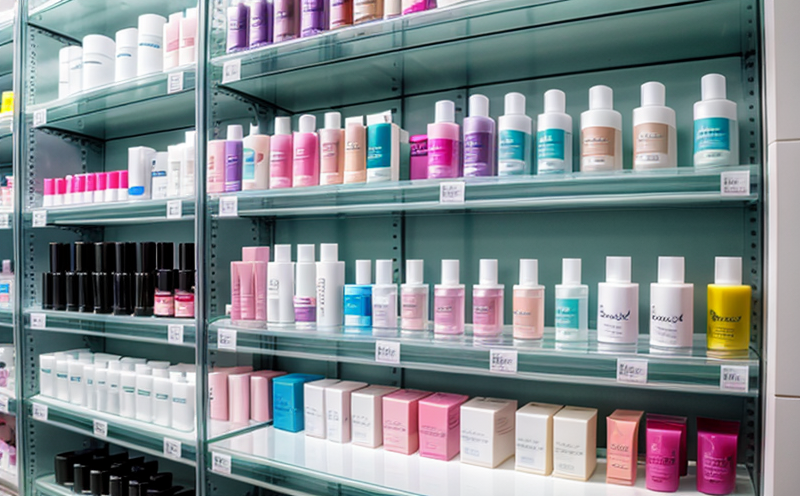Dye Fading Resistance Testing in Cosmetics
Testing dye fading resistance is a critical aspect of cosmetic product development and quality assurance. This testing ensures that the colors used in cosmetic formulations remain vibrant over time, maintaining consumer satisfaction and brand integrity. The stability and shelf life of cosmetic products are influenced by various factors such as environmental conditions, formulation ingredients, and packaging materials.
The process of dye fading resistance testing involves exposing samples to controlled environments designed to simulate real-world conditions that can cause color degradation. This includes exposure to light, heat, humidity, and oxidative stress. The purpose is to determine the durability of colors in cosmetic products under these adverse conditions.
Sample preparation for this test typically involves creating a stable sample in the form of a cosmetic formulation such as a lotion, cream, or powder. This allows the testing process to mimic real usage scenarios as closely as possible. The sample is then subjected to controlled environments that replicate various stressors like ultraviolet (UV) light, high temperatures, and humidity.
Instrumentation used in this type of testing can include UV-Vis spectrophotometers for measuring color changes over time or differential scanning calorimetry (DSC) for monitoring thermal stability. The data collected helps in assessing the fading resistance of dyes within cosmetic products. This information is invaluable for R&D engineers and quality managers who need to ensure product consistency and compliance with international standards.
Accurate testing methods are crucial, as they directly impact the reliability of results. Compliance officers often rely on such tests to verify that their products meet regulatory requirements set by bodies like the European Union or the US Food and Drug Administration (FDA). Properly conducted dye fading resistance tests not only enhance product performance but also contribute to a positive brand image.
The testing process is highly technical, requiring precise control over environmental parameters such as temperature and humidity. Real-world applications of this test include ensuring that makeup products retain their color integrity throughout shelf life, preventing consumer disappointment and potential brand damage. For instance, if a lipstick loses its hue prematurely, it could lead to negative reviews and reduced sales.
Understanding the chemical composition of dyes is essential for predicting how they will behave under different conditions. Dyes are typically synthetic compounds designed to absorb light within specific wavelengths, which contributes to their vibrant appearance in cosmetics. Factors such as molecular structure, solubility, and interaction with other formulation components can influence dye stability.
Another key aspect of this testing is the evaluation of packaging materials. The choice of container or tube can significantly affect the longevity of dyes within a cosmetic product. For example, glass containers provide better protection against light exposure compared to clear plastic containers. Therefore, selecting appropriate packaging alongside effective dye fading resistance tests ensures optimal product performance.
Compliance with international standards is paramount in this industry. ISO 20743-1 specifies the general requirements for cosmetic products, while ASTM D5895 outlines specific procedures for evaluating color stability under accelerated conditions. Adhering to these guidelines helps manufacturers ensure their products meet global quality expectations.
Given the complexity of dye fading resistance testing, it is advisable to work with experienced labs like Eurolab. Our team specializes in providing accurate and reliable results tailored to your specific needs. With extensive experience in cosmetic formulation analysis, we offer comprehensive support from initial sample preparation through final report generation.
Applied Standards
| Standard | Description |
|---|---|
| ASTM D5895-18 | This standard provides a method for determining the color stability of pigmented products using accelerated aging techniques. It helps manufacturers assess how well their formulations will withstand exposure to light, air, and other environmental factors over time. |
| ISO 20743-1:2015 | This document establishes the basic requirements for cosmetic products including safety, quality control measures, and labeling. It ensures that all components of a cosmetic product meet rigorous standards before being released to market. |
| EN 830:2019 | This European standard covers the performance of packaging containers for cosmetics, focusing on their resistance to light and other environmental influences that might affect product quality. |
| Standard | Description |
|---|---|
| IEC 62583-1:2017 | This international standard relates to the safety requirements for electrical devices used in connection with cosmetic products. While not directly related to dye fading resistance, it underscores the importance of overall product safety and compliance. |
| USP 2020-NF 35 | The United States Pharmacopeia provides specifications for ingredients used in pharmaceuticals and cosmetics. Compliance with these standards ensures that all components are safe and effective. |
Benefits
Dye fading resistance testing offers several significant benefits to cosmetic manufacturers:
- Enhanced Product Quality: Ensures that colors in your products remain vivid and consistent throughout their shelf life.
- Avoidance of Legal Issues: By meeting international standards, you reduce the risk of regulatory non-compliance leading to fines or product recalls.
- Better Consumer Satisfaction: Happy customers are more likely to recommend your brand and purchase again, fostering loyalty and positive word-of-mouth.
- Competitive Advantage: Demonstrating superior quality can set you apart from competitors in the market.
- Improved Brand Image: Consistent product performance enhances overall brand reputation and trustworthiness.
Eurolab Advantages
Eurolab offers unmatched expertise and resources in dye fading resistance testing for cosmetics. Our advantages include:
- State-of-the-Art Facilities: Equipped with cutting-edge equipment that provides precise and reliable results.
- Experienced Professionals: Our team comprises highly skilled scientists specializing in cosmetic science and testing protocols.
- Comprehensive Support: From initial consultation through final report, we offer full support to ensure your project’s success.
- Accurate Data: Utilizing advanced analytical techniques ensures that our findings are accurate and actionable.
- Timely Delivery: We understand the importance of timely results, so you can make informed decisions promptly.





